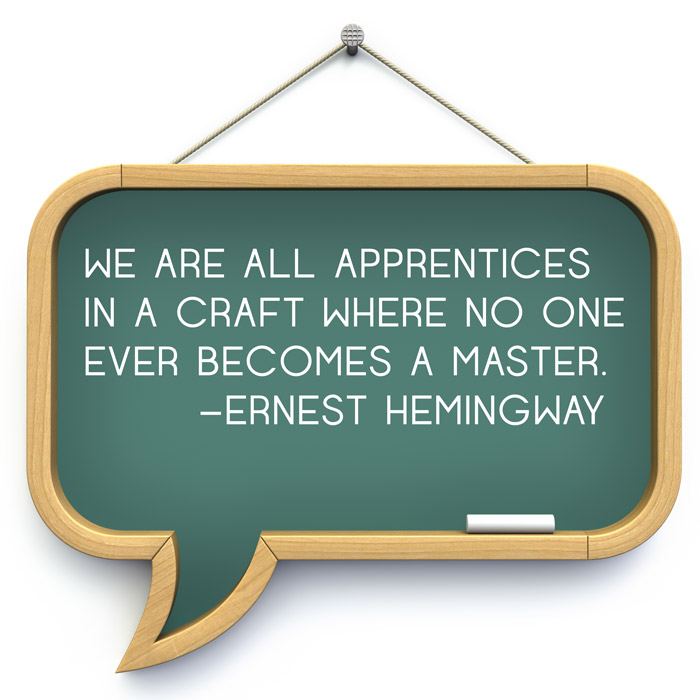I read somewhere that “it’s impossible to improve copy until it’s written down.” I couldn’t agree with this statement more. Whenever I sit down to write a blogpost or review, I sit down and I write. I let the words flow as fast as I can type. Then I go back and edit, proof read, change, delete, add and make dozens of changes to my original writing.
As I’m writing a paragraph, I may have a related idea that doesn’t quite fit into that paragraph, in those cases I simply hit the return key a couple times and then jot the idea down on a new line. After that, I quickly return to the paragraph I was working on and continue writing. As I get further into the article, I am then able to integrate those disjointed ideas into the whole article.
This is one way of writing blogposts and articles, and it seems to work for many people. It is quite different than the style you were probably taught in school where you have to write down the central topic, then three or four supporting ideas, then make an outline and then write your article. Write your introductory statement and paragraph, then build up with three to five paragraphs using your supporting ideas and finally close with a conclusion statement or paragraph. This is great if you’re writing an essay in college. But we all know that life doesn’t quite work that way.
The traditional approach is effective and very structured but if you’re not really good at writing, the process of creating all that structure can weigh you down and destroy the creative process. When writing a blogpost, the creative thought process, the flow of ideas onto the screen is the most important aspect of the whole thing. You can always go back and edit your thoughts. Rearrange words, delete a sentence or two, find a better phrase to articulate your thought.
I do not over-intellectualize the production process. I try to keep it simple: Tell the damned story.
—Tom Clancy, WD
But as the opening quote states, you can’t improve something that doesn’t exist, right? Doesn’t that just make sense?
I often hear this as an excuse for not starting a blog: I’m not a good writer. Or, nobody wants to read what I have to say. But this leads me back to the quote and makes me wonder, how do you know you’re not a good writer if you have not started writing? And how do you know you will not be able to improve your writing abilities and make your blogposts interesting enough for someone else to read?

You see,
Just like any other skill, writing is something you develop and improve by practicing. As you become a better writer, you’ll be able to write blog posts faster. You’ll be able to make blogposts more congruent with your ideas. You’ll be able to clearly communicate your message to a captive audience.Even today, after hundreds of blog posts under my belt I still feel that I am not a great blogger. I have so much room to improve, but if I don’t blog, if I don’t create something, then I don’t have something to improve upon. Even with practice, you will always be able to improve, even the best writers know this and continuously write and practice more and more.
As a business owner, you need to be heard, you need to demonstrate that you know what you’re talking about so people are more inclined to hire you or purchase from you instead of going to your competition. As I’ve stated before, a website with a blog is one of the best ways for you to clearly position yourself as the go to expert in your niche.
Practice makes perfect. The benefits of starting a blog are countless. The most notorious reasons for a business to start a blog are to put them on the map. To be found. When you write blogposts that are interesting to your target audience, you can be found. The topics in your niche become your blog topics, your potential customers are your audience. And Google and the other search engines are your ambassadors.
Google will deliver your blog posts to your audience; Twitter will share your posts with the world; Facebook will share your ideas with your friends and would-be customers. But
.





Yup. My saying: The only draft you can write the first time is the first one. So, don’t get bogged down hoping that your first draft will look like your last draft.
It won’t.
It can’t.
It shouldn’t.
Me, I aim for progress: Proper practice makes progress.
The idea of “perfect” can slow me down. That’s me.
Thanks, Oscar!
Well, Sarah you are absolutely right. And I know you’re doing really well. Some may look at your blog and think they can never be as good as you, but they fail to see that everyone has to start somewhere! — As I always say, perfect is the enemy of done.
Thank you! As a new blogger I am often very insecure and question why I am writing it in the first place. Nice to know experienced bloggers feel the same